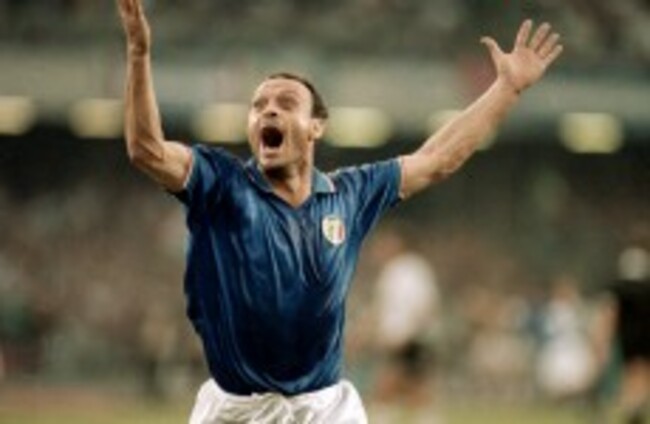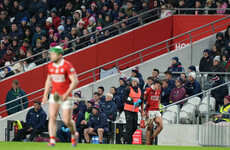Today Salvatore Schillaci celebrates his 51st birthday so we’re republishing this piece from June to mark the occasion.
THERE’S A SPECIAL poignancy to one particular scene in The Trip, the ‘mockumentary’ TV series starring Steve Coogan and Rob Brydon. Over a meal, the duo discuss their respective careers. Brydon, known for his impressions and appearances on inoffensive sitcoms, gives Coogan some advice.
“(The actor) Bob Balaban said: Never be hot, always be warm.”
Coogan, forever judged against the incredible success of his Alan Partridge comedy series, conjures a damning and intriguing response.
“I’d rather have moments of genius than a lifetime of mediocrity. I’d rather be me than you.”
Chapter One: “I’m sleeping, don’t wake me up, let me enjoy the dream.”
Our story begins on an evening in Roma twenty-five years ago. At the Stadio Olimpico, the World Cup hosts Italy are struggling to break down a dogged Austrian side in a Group A opener. The pressure. The heat. The intensity of the occasion. And they are wilting.
With fourteen minutes left, a desperate Azeglio Vicini stands on the sideline and summons a substitute. It isn’t Roberto Mancini – whose Sampdoria strike partner Gianluca Vialli is already on the pitch. It isn’t new golden-boy Roberto Baggio, whose summer move from Fiorentina to Juventus caused riots in Florence weeks before. Instead, it is a 25 year-old who has never played a senior competitive game for Italy before. This is the moment the world comes to Salvatore Schillaci.
In many ways, he wasn’t meant to be there. For years, Schillaci had plugged away at Messina, a lower league Sicilian side. Bit by bit, with the diminutive striker continuing to score, the team began to push higher up the totem pole. By 1988, they had reached Serie B when Zdenek Zemen arrived as manager and Schillaci racked up 23 goals in 35 games – his best ever return. Both men were rewarded for their efforts: Zemen moved to the top-flight and took over Foggia while Schillaci got his big-money transfer to Juventus. In his debut season, he managed an eye-catching fifteen goals and was Juve’s top scorer. Only Marco van Basten, Baggio and Diego Maradona had scored more.
But even with his domestic exploits, he was a long way from the Italian starting XI. He had no history with the national side. When he was included in Vicini’s World Cup squad, he could scarcely believe it, telling FourFourTwo last year:
My greatest satisfaction was just being selected for the Italian World Cup squad. I had no responsibilities as I was just one of the 22 players selected. That moment was fantastic, and even if I didn’t play, I would have been just as happy to be sitting on the bench.”
It was a sliding doors moment. Had the Austrian goalkeeper Klaus Lindenberger not frustrated Italy so much in that first group game, the entire story changes and Schillaci would never have been such a prominent World Cup memory.
“It’s why football still works because chance matters so much”, says John Foot, author of the definitive Calcio: A History of Italian Football.
“I don’t know how many chances Italy missed in the opening game but if Vialli or Andrea Carnavele puts one of them away, Schillaci doesn’t come on or never even plays. And he’s quite happy with that. He goes back to Juve, probably has a few more years there, might have a couple of games for Italy or might not.”
Instead, on the pitch for a matter of minutes, Schillaci headed home the game-winner after Vialli’s sumptuous cross from the right side. Italy had their nowhere man to thank for rescuing them.
“That was the side that played the best football out of any Italian team I’ve seen and it was packed with talent all the way through”, says Foot.
“It’s a totally extraordinary story, one that can only happen in football, really. Schillaci was just thrown in to the squad as a kind of 5th-choice striker. But it all goes right in those few weeks – every time he shoots, he scores and then they can’t leave him out. And it kind of unbalances the team a little bit.”
Of course, the goal against Austria was seen as a once-off. Against the USA, Schillaci was back on the bench and Italy didn’t need him – Giuseppe Giannini popped up with an early strike which proved the game-winner. Still, there was a simmering subplot. For the second match in a row, Carnevale, the Napoli attacker, was replaced by Schillaci – this time after 52 minutes. Having scored just twice in two games, Vigini decided to place his faith in the southern kid with the receding hairline. Against the Czechs, Schillaci was handed a start and netted again. In the knockout phase, he conjured a spectacular thunderbolt against Uruguay. He was unstoppable.
Schillaci told reporters: “I’m sleeping, don’t wake me up, let me enjoy the dream.”
“He had so much confidence by then”, says Foot.
“He comes on in the first game and basically scores with his first touch and there’s the celebration and the eyes and that becomes part of the story of Italia ’90. And it doesn’t matter after that, does it? Because he takes on a shot like that against Uruguay and it goes straight in the corner. Most of his goals for Juve in his best seasons were breaks or counter attacks. He wasn’t someone who thought too much about it. He wasn’t a clinical finisher or anything like that. He was someone who had a lot of pace and latched onto through balls. The stuff he did in the World Cup, he never really did again.”
Against the Republic of Ireland, he made the most of Packie Bonner’s parry and slid in the winner. Schillaci seemed the perfect metaphor for the Italian team – the romantic story, the fantasy that had come true. But in the semis, they fell to Argentina and the dream died in Naples. Schillaci did his part, scoring his fifth of the competition, but it wasn’t enough.
Chapter Two: “I don’t feel important. I’m not a star.”
“Everyone expected the goalscorer to be Vialli”, Foot says.
“He was an extraordinary player and there was an embarrassment of riches, Baggio coming off the bench in some games. It was a great team to watch and the enthusiasm of the Italians at that point was amazing. If they had won, it would’ve meant more to them than in 2006 because they were at home. It’s sad that they couldn’t get past Argentina in Naples – the wrong team won that game, basically.”
“I was thinking that the semi-final could be an entire book. It has the amazing setting of Naples, the whole Maradona thing, Baggio not playing from the start - it just has everything. The theatre of that game is extraordinary. And that whole thing in Italy of being knocked down so quickly after being built up. (Goalkeeper) Walter Zenga doesn’t allow a goal until the semi-final and breaks the record for minutes without conceding. Then he lets in one goal and he gets absolutely massacred in the press for a supposed mistake in that semi-final.”
If Zenga came in for criticism after Italy’s subsequent penalty shootout loss, Schillaci soon experienced something similar. Despite claiming the Golden Boot, having managed a sixth tournament goal in the 3rd/4th place play-off against England, Schillaci had flown too close to the sun and the burn was inevitable.
During the tournament, he was brutally honest about his meteoric rise. The words, sadly, were prophetic.
My secret? It’s no more than the fact I never feel sure of my place; not with the national team, not with Juventus. I don’t feel important. I’m not a star. I’m different this year because I’m playing with the stars.”
One year later and Juve had endured a difficult campaign, eventually finishing eighth – their worst season in thirty years. Schillaci’s goals dried up. He scored five and three of those came in a 5-0 thumping of Roma. The following season wasn’t much better as Baggio gleefully took centre-stage and Juve battled back under Giovanni Trapattoni with the increasingly-injured Schillaci an increasingly-peripheral figure.
Incredibly, in late 1991, he played in an international friendly against Bulgaria. It was his last appearance for the national team. In total, his Azzurri career lasted for one year and 177 days as Italy missed out on the European Championships.
Chapter Three: “I have no regrets.”
In 1992, Schillaci joined Inter. He scored six times in his debut campaign though he was mainly used as a substitute. It was a similar story the following season. Struggling to deal with the fall-out, everything began to unravel. There was a messy divorce, there was the relentless and unforgiving fitness issues and there was the abuse.
“When he starts playing badly after the World Cup, he becomes this joke figure”, Foot explains.
“He was someone who played very much on instinct. He couldn’t pass or do much of anything else. It’s even amazing to think that he had that career at Juve before. He was punching above his weight at Juve, really. He was a Serie B player, basically – a good one, a good striker.”
“His southernness ends up being used negatively. His brother had been arrested for stealing tyres and so crowds used to hold up massive ones at games – as this sort of criminal stereotype thing.”
When he was a national hero, his background becomes part of the national unifying myth – south and north together, working to the same end. But it’s a very brief thing. He’s called a terrone - an insult used in the north to describe southerners – and he has that awful spell with Inter. Every time he’d come on in games, the crowd would just snigger – this was very quickly after the World Cup. So it was a short honeymoon, really.”
By the time Italy reached the World Cup final in the summer of 1994, Schillaci was thousands of miles away, literally and figuratively. Offered over $1m a year to play for J-League side Jubilo Iwata, he jumped at the chance to escape from the nightmare of Serie A and swapped Milan for Japan.
Explaining the move at the time, Schillaci said it was a no-brainer.
“They give me a house, a car, an interpreter, and a lot of money. Let’s be frank. In the end, this is what we play for. I’m certainly not stupid. This can be an important experience for me and I’d be crazy to refuse. It will mean making a sacrifice for a year and a half, and I will hardly see my children. But I have no regrets.”
Schillaci enjoyed himself in Japan. He enjoyed the anonymity. He enjoyed being lauded rather than condemned. He enjoyed being a hero again. He spent three seasons with Jubilo and won a league championship with them in 1997. He would’ve stayed longer had it not been for another injury that robbed him of more playing time. He eventually retired in 1999.
“The World Cup is just this extraordinary three weeks of Schillaci’s career” says Foot.
“And then he can’t really deal with the fame. It’s just too much. And in a way, he cracks in that post-World Cup superstar status, which he absolutely can’t handle. He’s not equipped to deal with it. He is playing for Juve – he’s not meant to be a national hero.”
In Italy, he did a TV show – kind of like ‘I’m A Celebrity Get Me Out Of Here’ and it was quite sad because he’s just a nice guy, still very down-to-earth, not particularly highly-intelligent and he was talking on this programme about his life. And it was a moving thing. Because he had this blast of fame and it completely burnt him out. How many times did he play for Italy after the World Cup? A ridiculously small amount. He was very quickly dropped. His whole national career was that World Cup. I don’t think there’s been anything like that kind of rise and fall ever since.”
But the wounds have now healed. Perhaps there’s been a realisation of just how romantic Schillaci’s story was and still is and how the likes of it will never be seen again. Whatever the reasons, he occupies a special place in the hearts of all Italians, in contrast to the wider memories of what proved a difficult tournament for the country.
“I think people are very affectionate towards him now”, says Foot.
“I think with the backlash, it was very easy to resort to the racist stereotypes and so on. He’s not a public figure in any way but when he does appear, people are affectionate towards him and the memory of 1990 remains whereas lots of other things linked to Italia 90 are very problematic. The legacy of the tournament is not a good one at all in terms of politics and the stadiums themselves. One’s already been knocked down, there were lots of white elephants, so much money thrown down the toilet, lots of arrests, the San Siro wasn’t improved but made worse. Much of it was a disaster but the image it showed to the world was a kind of glittering, glamorous Italy but that wasn’t reality.”
And what’s Schillaci’s legacy?
“It’s one of those miraculous stories that football throws up. I wouldn’t draw him as a tragic figure now. He certainly was in the years after – he was like a dead man walking. It was very weird to see. He had no respect from anybody for what he’d achieved and the tragedy of it was that he couldn’t do it again. It was a flash-in-the-pan situation. If they’d won, it wouldn’t have mattered what he did afterwards, would it? But that’s part of the story.”
















16:26 “couldnt find a blue shirt” …not surprising..they were all down in Beal na mblath!
Jesus wept….
Re 16.26 neither player is spanish both are from argentina # lazy journalism
Cheers Brian.
Citogs don’t take good pens,
Sickened with the result. Was hoping the Saints would stuff them. Could have done if they didn’t gift them the 2 goals towards the end! : (